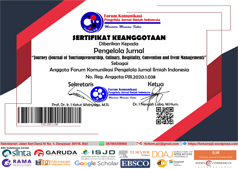An Exploration Of Traditional Entil Food In Tabanan Regency
Abstract
Entil is a unique traditional Tabanan dish made from rice wrapped in Kalingidi leaves, then boiled for 4-5 hours. This specialty food is primarily known to residents of Pupuan and Penebel sub-districts and is traditionally prepared during special occasions such as Ulihan and Nyepi rituals. Beyond its cultural significance, entil represents an untapped potential for culinary tourism development in the region. This research employs a descriptive qualitative method to explore the meaning and philosophy of entil in depth while examining its potential as a culinary tourism attraction. Data sources are divided into primary and secondary data, with collection techniques including literature studies, interviews, and direct observation. Data analysis focuses on qualitative information from literature and interviews using narrative and discourse analysis. The research applies Roland Barthes' food evolution/structuralist theory to understand the formation of philosophical meanings that reflect symbolic and ritual values in food. The results indicate that entil embodies three primary meanings: historical significance, cultural identity, and potential for creative economy development through culinary tourism. In the philosophy of the Tabanan people, entil is believed to be an offering to God during the Ulihan ceremony and is considered a "souvenir" for the god Pitara/ancestors when returning to heaven. This research also highlights how entil can serve as a unique selling proposition for culinary tourism in Tabanan, contributing to sustainable tourism development while preserving local culinary heritage.
Copyright (c) 2025 Owen Pratama, Billy Tanius, Ni Ketut Veri Kusumaningrum

This work is licensed under a Creative Commons Attribution 4.0 International License.
















